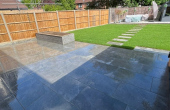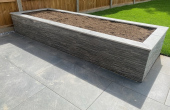Telephone: 0118 229 2486
Home›News›Combining Aesthetics with Durability: Landscaping Materials that Stand the Test of Time
Combining Aesthetics with Durability: Landscaping Materials that Stand the Test of Time
Landscaping is more than just arranging plants and structures in your garden; it's about creating an outdoor space that stands the test of time. At Daniel Moquet UK, we understand the significance of choosing landscaping materials that not only enhance the aesthetics of your garden but also endure the rigours of the British climate. In this article, we will delve into the world of landscaping materials, helping you make informed decisions for your outdoor haven.
The Importance of Choosing Durable Landscaping Materials
When it comes to landscaping, longevity is key. The materials you select for your garden should be able to withstand the ever-changing British weather, ensuring your outdoor space remains not only beautiful but also functional. Whether you're considering a new patio, driveway, or fencing, the durability of your chosen materials is paramount.
Preview of What's to Come
We will explore a variety of landscaping materials, from the timeless appeal of natural stone pavers to the practicality of concrete and interlocking pavers. Additionally, we'll discuss the warmth and character that timber brings to your garden, as well as the versatility of gravel and crushed stone. Fencing, as an integral part of garden design, will also be a focal point. Finally, we'll guide you on making informed decisions and showcase how Daniel Moquet UK can transform your landscape.
Understanding the Foundation
The Role of Landscaping Materials in Garden Design
Landscaping materials serve as the foundation of your garden's design. They contribute to the overall aesthetics, functionality, and longevity of your outdoor space. As you embark on your landscaping journey, consider how each material choice will impact your garden's appeal and practicality.
Factors to Consider When Selecting Materials
Before diving into specific materials, it's essential to understand the factors that influence your choices:
1. Climate: The British climate can be unpredictable, with varying levels of rainfall and temperature. Select materials that can withstand these conditions without deteriorating.
2. Usage: Think about how your garden will be used. Do you need a durable driveway material or a comfortable patio surface for entertaining guests?
3. Maintenance: Consider the level of maintenance each material requires. Low-maintenance options can save you time and effort.
4. Aesthetics: Your choice of materials should align with your garden's design theme. Whether you prefer a traditional, contemporary, or rustic look, there's a material to suit your vision.
Balancing Aesthetics and Longevity
Achieving the perfect balance between aesthetics and longevity is the hallmark of successful landscaping. While it's tempting to opt for materials solely based on appearance, it's equally crucial to assess their durability. A beautiful garden is only truly timeless if it stands strong against the elements for years to come.
By keeping these considerations in mind, you'll be better prepared to explore the world of landscaping materials with confidence. In the following sections, we'll delve deeper into specific materials and their unique characteristics.
Timeless Beauty: Natural Stone Pavers
The Allure of Natural Stone
Natural stone pavers are renowned for their timeless beauty and elegance. Quarried from various regions, such as limestone, sandstone, and granite, these materials offer a distinctive and authentic appearance that can transform any outdoor space. The irregular patterns and unique textures of natural stone add a touch of sophistication to gardens of all styles.
Types of Natural Stone Pavers
Limestone: Limestone pavers exude a classic charm with their muted earthy tones. They are ideal for creating a traditional, rustic ambience in your garden.
Sandstone: Sandstone pavers come in a range of colours, from warm browns to cool blues and greys. Their versatility makes them suitable for both modern and traditional landscapes.
Granite: Known for its durability and striking appearance, granite pavers are available in various shades, including deep blacks and light greys. They are perfect for creating contemporary outdoor spaces.
Benefits of Natural Stone for Your Landscape
Natural stone pavers offer numerous advantages for your garden:
1. Durability: These materials can withstand the harshest weather conditions, ensuring they remain in excellent condition for years.
2. Aesthetic Appeal: The unique beauty of natural stone adds a touch of luxury and character to your landscape.
3. Low Maintenance: Natural stone is easy to clean and requires minimal maintenance, making it a practical choice.
4. Versatility: It complements various garden styles, from traditional English gardens to modern minimalist designs.
5. Increased Property Value: The addition of natural stone pavers can enhance your property's curb appeal and value.
When you choose natural stone pavers for your garden, you're not just investing in materials; you're investing in a timeless masterpiece that will stand as a testament to your landscaping vision.
Paving the Way: Concrete and Interlocking Pavers
Durability of Concrete Pavers
Concrete pavers have gained popularity in the landscaping industry due to their remarkable durability and versatility. These pavers are engineered to withstand heavy loads and the rigours of the British climate, making them an excellent choice for various applications.
Concrete pavers offer several advantages:
1. Strength: They can endure heavy foot traffic and the weight of vehicles, making them suitable for driveways, walkways, and patios.
2. Colour and Texture Options: Concrete pavers come in an array of colours and textures, allowing you to customize your outdoor space according to your preferences.
3. Cost-Effective: Concrete pavers are often more budget-friendly than natural stone, offering a cost-effective option for achieving an attractive landscape.
Interlocking Pavers: A Smart Choice
Interlocking pavers take concrete paving to the next level. These pavers feature a unique design that allows them to interlock seamlessly, creating a stable and durable surface. They are available in various shapes and sizes, allowing for creative patterns and designs.
Key benefits of interlocking pavers include:
1. Strength and Stability: Interlocking pavers create a robust surface that can withstand heavy loads and resist shifting over time.
2. Easy Installation: Their interlocking design simplifies the installation process, reducing labour costs and project duration.
3. Design Flexibility: You can create intricate patterns and incorporate contrasting colours to achieve the desired aesthetic.
4. Low Maintenance: Interlocking pavers are relatively low-maintenance, requiring periodic cleaning and joint sand replacement.
Design Versatility with Concrete and Interlocking Pavers
Whether you envision a sleek modern patio or a classic cobblestone driveway, concrete and interlocking pavers offer the design flexibility to bring your vision to life. These materials combine durability with aesthetic appeal, making them a practical and attractive choice for a wide range of landscaping projects.
Wood in Landscaping: Decking and Timber Structures
Enhancing Your Garden with Timber
Timber has long been celebrated for its warmth, character, and versatility in landscaping. When used in garden design, it can add a natural and inviting ambiance to your outdoor space. Here, we'll explore two primary applications of timber in landscaping: decking and timber structures.
Choosing the Right Wood for Decking
Hardwood Decking: Hardwood options like oak and teak are known for their durability and resistance to decay. They lend a timeless elegance to your garden.
Softwood Decking: Softwood choices like pine and cedar are more affordable and easier to work with. While they require more maintenance, they can still offer years of service.
Timber Structures for a Rustic Charm
Timber structures, such as pergolas, gazebos, and trellises, can elevate your garden's aesthetics and functionality. They provide shade, support climbing plants, and create charming focal points. When selecting timber for such structures, consider its resistance to rot and insect infestations.
The warmth and character of timber can transform your garden into a cosy retreat or a space for outdoor gatherings. Whether you opt for decking or timber structures, your garden will exude a rustic charm that stands the test of time.
Strength in Simplicity: Gravel and Crushed Stone
The Versatility of Gravel and Crushed Stone
Gravel and crushed stone are landscaping materials known for their simplicity, versatility, and practicality. They can be used in various garden applications, from pathways and driveways to decorative elements.
Applications in Landscaping
Pathways: Gravel and crushed stone create charming pathways that guide visitors through your garden. They provide a natural and rustic look that complements various garden styles.
Driveways: These materials are an excellent choice for driveways due to their excellent drainage properties and durability. They can withstand the weight of vehicles while preventing water runoff.
Decorative Features: Gravel and crushed stone can be used to create decorative features, such as dry riverbeds, borders, and accents around plants.
Maintaining Gravel and Crushed Stone Paths
While gravel and crushed stone are relatively low-maintenance options, they do require some care to ensure they remain in good condition:
1. Weed Control: Use landscape fabric or a weed barrier beneath the gravel to prevent weed growth.
2. Regular Raking: Periodically rake the surface to maintain an even appearance and address any displacement.
3. Refilling: Over time, gravel paths may settle, requiring the addition of more material to maintain the desired depth.
Gravel and crushed stone offer a cost-effective and aesthetically pleasing solution for your garden's hardscape needs. Their simplicity can complement both traditional and contemporary garden designs.
Elegance in Fencing: Materials for Privacy and Style
Fencing as a Landscape Element
Fencing serves multiple purposes in your garden. It defines boundaries, provides privacy, and enhances security. Beyond its functional aspects, fencing can be an essential element of your landscape's aesthetics.
Types of Fencing Materials
Wooden Fencing: Timber fences exude a classic, natural appeal and can be stained or painted to match your garden's style. They provide privacy and are suitable for a range of garden designs.
Metal Fencing: Metal fences, such as wrought iron or aluminium, offer a timeless and elegant look. They are often chosen for their durability and low maintenance.
Composite Fencing: Composite materials combine wood and plastic to create a fence that's both attractive and long-lasting. They are resistant to rot, insects, and fading.
Bamboo Fencing: Bamboo fences lend a unique, exotic charm to your garden. They are eco-friendly, lightweight, and perfect for creating a natural, Zen-like atmosphere.
Longevity and Aesthetic Appeal in Fencing
Selecting the right fencing material involves considering both longevity and aesthetic appeal. The material should not only withstand the elements but also complement your garden's overall design. Additionally, proper installation and maintenance are crucial to ensure the fence's longevity.
Fencing can be both functional and stylish, adding character and security to your outdoor space. It's an investment that, when chosen wisely, can elevate your garden's aesthetics and privacy.
Investing in Your Landscape's Future
The Cost-Effectiveness of Durable Landscaping Materials
Investing in durable landscaping materials is a wise decision for several reasons:
1. Longevity: Durable materials last significantly longer than their cheaper counterparts, reducing the need for frequent replacements and repairs.
2. Reduced Maintenance Costs: Materials that require less maintenance save you both time and money over the long term.
3. Increased Property Value: A well-landscaped garden with quality materials can enhance your property's curb appeal and overall value.
4. Sustainability: Many durable materials are eco-friendly, contributing to a more sustainable garden and reducing your environmental footprint.
Environmental Considerations
As responsible stewards of the environment, it's crucial to consider the environmental impact of your landscaping choices. Opt for materials that are sourced sustainably and have minimal negative effects on the ecosystem. Additionally, consider permeable materials that allow rainwater to penetrate the soil, reducing runoff and supporting local ecosystems.
By choosing materials that stand the test of time and have minimal environmental impact, you're making a sustainable investment in your landscape's future.
Tips for Making Informed Decisions
Evaluating Your Garden's Needs
Before embarking on a landscaping project, it's essential to assess your garden's unique requirements:
1. Usage: Determine how you intend to use your outdoor space. Are you looking for a relaxing retreat, a play area for children, or an entertainment hub?
2. Style: Consider your preferred garden style, whether it's traditional, contemporary, or something in between. Your material choices should align with your aesthetic vision.
3. Budget: Define your budget for the project, including materials, labour, and ongoing maintenance costs. This will help you make cost-effective decisions.
4. Maintenance Preferences: Be honest about your willingness to maintain the garden. Some materials require more care than others, so choose accordingly.
Consulting with Landscaping Experts
Engaging with landscaping professionals is a valuable step in your decision-making process. They can offer insights, recommendations, and design expertise based on your garden's unique characteristics. Their experience can help you make informed choices that align with your vision and budget.
Exploring Trends and Inspirations
Keeping up with landscaping trends can provide inspiration for your project. Whether it's incorporating native plants, embracing sustainable practices, or experimenting with innovative design elements, staying informed can lead to a garden that's both beautiful and practical.
As you embark on your landscaping journey, remember that it's a collaborative effort between your vision, expert guidance, and the right choice of durable materials.
Conclusion
In the world of landscaping, combining aesthetics with durability is the key to creating a garden that stands the test of time. Your choice of landscaping materials plays a pivotal role in achieving this balance. From natural stone pavers to concrete and interlocking pavers, timber structures to gravel and crushed stone, and elegant fencing options, there's a wide array of materials at your disposal.
By understanding the characteristics of these materials and considering factors like climate, usage, maintenance, and aesthetics, you can make informed decisions that transform your outdoor space into a lasting masterpiece.
At Daniel Moquet UK we're committed to helping you realise your landscaping dreams. Our expertise in hard landscaping, coupled with a passion for creating beautiful and enduring outdoor environments, sets us apart. Whether you're seeking a new driveway, patio, or garden path, we offer a range of high-quality materials and professional craftsmanship to bring your vision to life.
The marriage of aesthetics and durability is not just a concept; it's the cornerstone of exceptional landscaping. Contact us today to discover how Daniel Moquet UK can transform your landscape into a timeless work of art.
If you have any further questions or require expert guidance, please don't hesitate to get in touch. We look forward to the opportunity to work with you and enhance your outdoor living space.









 Over 40 years of experience working collectively
Over 40 years of experience working collectively A 'Quality Service Guarantee'
A 'Quality Service Guarantee' Premium industry-leading products
Premium industry-leading products